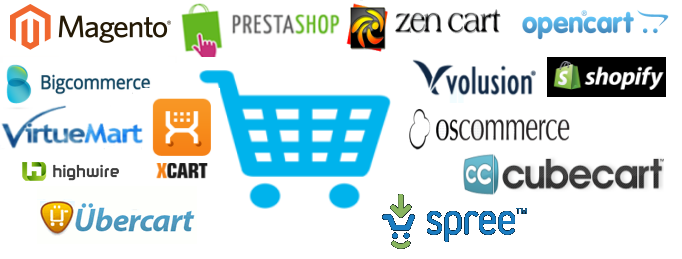A Thumbnail Guide to 15 Shopping Carts
As security becomes more refined and customer prejudices are overcome and consumer confidence established, many developers and designers are finding their clients and employers want to explore ecommerce opportunities.
There’s a lot involved. The online buying and selling of products and services can demand expertise with in fields including electronic funds transfer, supply chain management, electronic data interchange (EDI), online transaction processing, client-side and server-side validation, mobile commerce, Internet marketing, automated-data collection systems, and inventory management systems.
It’s not surprising that the provision of ecommerce software itself drives an enthusiastic and sometimes aggressive market. Some long term providers have sustained themselves, some newer providers draw on new technology and smart marketing, and there are always one or two that are flavor of the month.
Let’s take a brief look at who’s doing what.

Here’s a quick guide to 15 of the most widely used ecommerce frameworks, platforms and solutions.
While they all come with amazing sets of features and options facilitating the easy creation of an online store, they do also each have particular strengths.
Have a look and find the one that suits your needs the best.
Magento is the undoubtedly the most popular and arguably the best open-source shopping cart framework, with advanced stats, customer groups’ management, a nice admin interface, and loads of payment gateways for seamless shopping experience.
This robust, professional open-source e-commerce framework comes with loads of features and an appealing admin interface that can be easily downloaded, installed and used free of cost. Prestashop on the back end comes with a fully-featured back-office application that can help manage your online business (including inventory, orders, shipping, and customers) in real-time. Here, you can easily send your customer’s payments directly to your commercial bank account using the latest security technology.
This open-source shopping cart is really easy to install, customise and manage install. Besides, it comes with a newsletter manager, discount coupons, gift certificates and all the basic features that make it a great ecommerce platform.
This is an extremely scalable and attractive e-commerce framework that will help you use multiple languages, accept multiple currencies, create an unlimited number of categories, sell an unlimited number of products, and choose from over 20 payment and 8 shipping methods. Besides it is user-friendly as well as SEO-friendly, which will help you gain prominence in the search engine.
This framework allows the selling of products on Facebook and eBay, or on your own store. If you want to get the option of selling unlimited products on your website, you may opt for a Platinum Plan for $149.95/month. There is also a free 15-day trial option in case you wish to explore the possibilities with BigCommerce, before making the actual purchase.
This all-in-one hosted e-commerce platform offers a fairly competitive pricing and 14-day free trial as well. It also offers value-added services like 24×7 support too.
This PHP/MySQL template-based secure shopping cart software offers the flexibility for easy and unlimited design creation to suit your business specific features.
This open source e-commerce solution designed to work alongside Joomla! integrates well with the CMS and takes advantage of the Ajax technology. This neat cart besides allowing customers to buy things makes them comfortable by letting them create an account, add addresses and access their order history. It also supports multiple currencies and languages, including unlimited products and categories.
This framework that comes with reasonable pricing and a free trial allows you to create templates quickly from scratch for your own online store. It offers great features like safe shopping carts, e-commerce templates, plus web hosting.
This free e-commerce framework is easy to set up and run; and is extremely popular. However, it comes with a disadvantage that it is difficult to differentiate your store from the thousands of others out there in business.
The USP of this free framework is that besides allowing you to set up your own store, it also allows using it for selling on eBay or Facebook. Moreover, with Highwire you can keep tabs on all your orders and payments from one centralized system.
This framework integrates well into WordPress and is mostly available for free with the possibility to extend functionalities with the Golden Cart solution.
This framework is specifically designed for people selling things like event registrations, file downloads, website access passes and event tickets, instead of physical products. Ubercart requires to be integrated with Drupal; thus Drupal users will feel comfortable choosing the ideal modules and themes to customise their shop with this platform.
This framework integrates really well into all kinds of sites and looks very professional. While CubeCart 3 is free, CubeCart 4 – the premium platform, costs £110. Investing in CubeCart 4 is a good idea if you are planning long term use; however try with the third version first.
Spree, the open-source ecommerce framework uses the power of Ruby On Rails. Available with stunning default shop template and admin template, you can create a flexible and powerful shopping cart with Spree. Moreover, it has built-in Google Analytics integration and support over 50 payment gateways.
So, which is your favorite e-commerce framework? Did I leave it out of my list? Leave your comments below, we’d love to hear from you.
Frequently Asked Questions about Shopping Carts
What are the key features to look for in a shopping cart?
When choosing a shopping cart, consider its ease of use, payment gateway integrations, security features, customization options, and customer support. It should have a user-friendly interface, support a variety of payment methods, ensure secure transactions, allow customization to match your brand, and provide reliable customer support.
How does a shopping cart impact SEO?
A shopping cart can significantly impact your site’s SEO. It should be optimized for search engines, with SEO-friendly URLs, proper use of heading tags, and the ability to add meta descriptions and title tags. It should also load quickly to reduce bounce rates and improve user experience.
Are there shopping carts designed specifically for mobile users?
Yes, many shopping carts are designed with mobile users in mind. They feature responsive designs that adapt to different screen sizes, easy navigation, and mobile-friendly checkout processes. Some also offer mobile apps for an even smoother shopping experience.
How can I customize my shopping cart to match my brand?
Most shopping carts allow customization to match your brand. You can change the color scheme, add your logo, and modify the layout. Some even offer advanced customization options through CSS and HTML editing.
What are the benefits of using a hosted shopping cart?
A hosted shopping cart provides a hassle-free solution for businesses. It takes care of hosting, security, updates, and backups, allowing you to focus on running your business. It also offers technical support to help you resolve any issues.
How does a shopping cart handle taxes and shipping?
A good shopping cart should automatically calculate taxes and shipping costs based on the customer’s location. It should also support different tax rates and shipping methods, and allow you to set up free shipping promotions.
Can I integrate my shopping cart with other business tools?
Yes, most shopping carts can be integrated with various business tools such as email marketing services, CRM software, accounting tools, and analytics platforms. This allows you to streamline your operations and improve efficiency.
How does a shopping cart handle inventory management?
Many shopping carts come with built-in inventory management features. They can track stock levels, send alerts when stock is low, and automatically update inventory when a product is sold.
Can I offer discounts and coupons through my shopping cart?
Yes, most shopping carts allow you to offer discounts and coupons. You can set up percentage or fixed amount discounts, create coupon codes, and set expiration dates for your promotions.
What are the costs associated with using a shopping cart?
The costs of using a shopping cart can vary widely. Some are free, while others charge a monthly or annual fee. There may also be transaction fees, especially if the shopping cart includes a payment gateway. Additionally, you may need to pay for add-ons or upgrades to access certain features.
Daniel Rusling is an experienced tech writer associated with VITEB, a leading web design company in India that develops rich web applications and mobile ecommerce solutions for clients.

